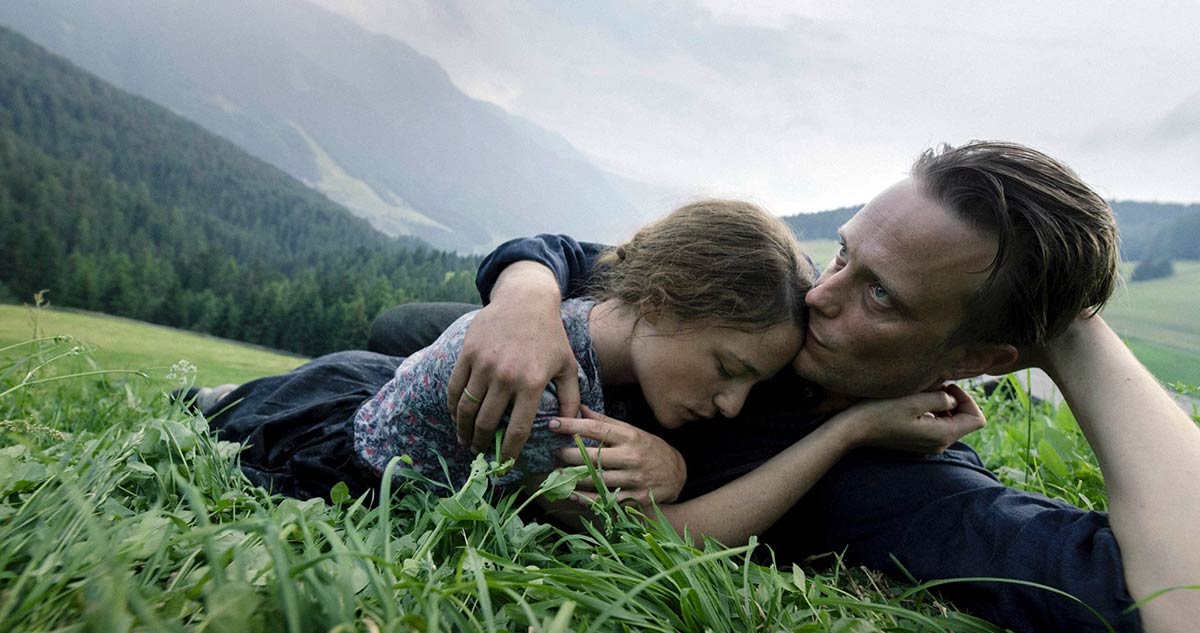The films of Terrence Malick search for wisps of purity in a turbulent, compromised world. The latter part of that practice regularly changes with each new project, from the plague-stricken heartland to an untamed America invaded by settlers to Austria under Nazism that sets the scene for the master’s latest, “A Hidden Life.” Malick is pretty consistent about the expressions of that purity, though; he sees innocence and decency in children, animals, and natural splendor.
READ MORE: 2019 Cannes Film Festival: The 21 Most Anticipated Movies
His last few films have suffered from an incongruity between these two elements of his style, as the de facto trilogy of “To the Wonder,” “Knight of Cups,” and “Song to Song” grasped for saintliness in materialist milieus such as Hollywood and Austin’s music biz. But with the true story of conscientious objector Franz Jägerstätter (August Diehl), Malick has taken leave of our crass present and found refuge in history once again. He’s right at home, too — at last, the return to form that Malick’s loyal acolytes have spent most of this decade awaiting with an unshakable faith befitting the matter at hand has arrived.
READ MORE: the 100 Most Anticipated Films Of 2019
Whispered voice-overs? Check. Twirling camerawork? Check. Breathtaking vistas of fog-swathed mountains and mighty waterfalls and rolling grassy knolls? Check, check, and check. Malick’s methods haven’t changed one iota, which will come as a relief for some and a permission slip to not watch this film for others. He’s only gotten more clear-eyed about how to apply them, selecting the 20th-century footnote in sync with his devotion to God and His creation. Luxuriating in the bounty of Mother Gaia makes more sense in the tucked-away village of Radegund, a paradise hidden from the ascendant Nazi forces that don’t quite gel with Franz’s unerring ethical compass. Until it isn’t, and the evil lurking in the hearts of man comes to tarnish the elysium Franz, and his loyal wife Franziska (Valerie Pachner) have built for themselves.
READ MORE: Summer Movie Preview: 35 Films You Shouldn’t Miss
As the Third Reich encroaches and eventually drags Franz to prison for refusing to join their ranks, the film splits itself in twain along the dividing line between the sacred and the profane. Malick cuts back and forth between Franziska holding it down on the home front and Franz’s efforts to stand tall against the Nazis’ increasingly aggressive campaign to break him, establishing a clear contrast between our potential for tenderness and cruelty. These two primal forces commingle in all things, however, forming a universe requiring moral stands on a daily basis. Franziska’s half contains trace amounts of inhumanity (the resentful townspeople of Radegund spit into her water bucket as she walks through the main drag), just as Franz’s half has its moments of mercy (he finds a kindred in a fellow prisoner played by “Transit” star Franz Rogowski).
READ MORE: The 25 Best Films Of 2019 We’ve Already Seen
Franz’s captors repeatedly emphasize to him that his efforts signify and accomplish nothing, that he will be erased from history and shortly thereafter forgotten. Because we’re watching a movie about his life and times, even the audience members unaware that Franz achieved posthumous sainthood know that that’s not true. But the possibility of doubt over that much still holds a lot of weight back in the ‘40s, posing a test of Franz’s commitment to his cause. It recently came out that Malick wrote to Martin Scorsese after seeing his” Silence,” “What does Christ want from us?” This question haunts our steadfast hero as he withstands beatings and starvation, his only solace in his sureness that he’s not meant to know.
Franz wasn’t spoken to by God, by the way. One of the many Hitler sycophants trying to crush the holdout’s spirit asks if he was, and the only response Franz ever gives is that he’s doing the right thing instead of the wrong one. It’s a secular take on a one-man crusade, reinforcing Malick’s ambition to assess the whole of creation itself. “The Tree of Life” spanned eons to capture the entirety of existence, and while the filmmaker works on a tighter four-year canvas this time around, the feeling that the stakes are nothing less than the soul of all humanity has persisted. This is art of salvation.
At the film’s first press screening for Cannes attendees, I heard some grumbles on the way out about Malick overstaying his welcome. Even a couple of friends enamored of the film have suggested that the three-hour run time could be trimmed down. With all respect and affection, this is sacrilege. Though he’d probably object to the comparison, Malick attains the status of holy creator here, forging his own lush world of suffering and deliverance. Time spent in the presence of the divine is a privilege, and limiting that much doesn’t feel to me like an addition-by-subtraction situation. I know, I know — spoken like a born-again convert. But those prone to prostrate before high priest Malick will be rewarded for their devout allegiance to his filmography. We are all of us, blest. [A]
Click here for more 2019 Cannes Film Festival coverage.
https://www.youtube.com/watch?v=HWC4dVB8n1s





